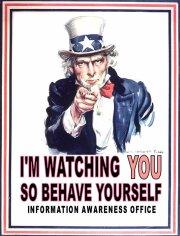Man, so many things to say about this item in today’s Wikinews.
Instead of trying to write something clear and sensible (I’ve slept about 5 hours since Monday) I’m just going to pull quotes from the article and comment on them.
“The secret network is a component of the HSIN, which is the primary conduit for DHS to share information on terrorist threats, suspicious activity and incident management with state, local, tribal and private-sector officials.”
You know, that kind of almost made sense until it got to “private-sector officials”. Are we talking MegaCorp ™ here, or what? Private security firms? Typically isn’t the ultimate protection against misuse of some of this kind of information that the government is accountable to the people? Wouldn’t sharing that information with the private sector amount to removing that accountability protection? (Not that Mr. Cynical here actually thinks there is any kind of accountability in America anymore. Ask Karl.)
With the “Secret” component in place, classified information can now be disseminated to authorized individuals at all levels of government and business throughout the country almost instantly.
I guarantee that I am not the only person who sees the irony in making a system for the fast, widespread dissemination of information that is meant to be secret.

HSIN lets most government agencies as well as many private companies doing business with the government share information on the whereabouts and suspicious activities of anyone that comes to their attention.
Wow, that “private sector officials” thing looks a lot more ominous in the context of that sentence, doesn’t it? Talk about a privacy nightmare. Oh well, I’m sure we can trust the government and the private sector not to misuse this information.
Don’t even get me started on “suspicious”. Thank God I’m white, I guess.
Internal policies and the judgement of the system’s users provide privacy and civil rights protections, while who can access the system is determined by DHS.
See, it’s there in black-and-white: we don’t need silly things like civil rights or privacy laws–we can trust the judgement of the system’s users to protect our privacy and civil rights. (And yes, that includes Marty at the water cooler. You know Marty. Don’t you think he can be trusted?)
I feel like a lot of people have not learned the lessons of history, with respect to power and how it is handled.
I guess it could be worse: they could make us carry tracking devices around or something.
I want to cry now.

